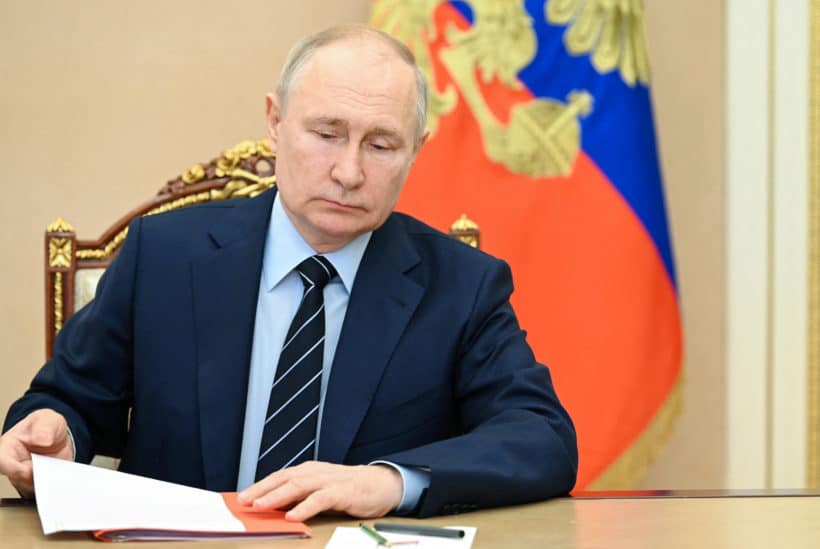
LONDON, Aug 4 (Reuters) – Russian President Vladimir Putin has a reputation for keeping other national leaders waiting. But Egypt’s Abdel Fattah al-Sisi appeared to turn the tables at last week’s Russia-Africa summit, leaving the Russian leader in front of the cameras for almost half a minute before entering the room.
The St Petersburg summit appeared intended to showcase strong mutual relations despite Russia’s invasion of Ukraine. Instead, it was overshadowed by Russia’s withdrawal from a UN-brokered deal on Black Sea grain, and Putin’s decision not to attend a summit of the BRICS developing nations in South Africa.
Attempts by African nations to negotiate a ceasefire in Ukraine also appear to have made little headway.
Russian officials may view the attendance of 17 African leaders as a positive, with the conference statement repeating multiple Kremlin talking points. But it represented a significant slump since 2019, when leaders from 45 of Africa’s 54 nations attended the Kremlin’s inaugural Africa summit in the Black Sea resort of Sochi.
Putin vowed in Sochi to double Russian trade with Africa from around $20 billion a year within five years. Instead, first the pandemic and then the Ukraine war battered that target, with only $14 billion in trade in 2020 recovering to what Putin says was $18 billion in 2022.
Russian officials say there was a further 35% increase on that in the first six months of this year despite international sanctions. Traditionally, about 70% of Russia’s Africa trade has been with just four countries – Egypt, Algeria, Morocco and South Africa.
While Africa’s more established powerbrokers still seem keen to retain contact with the Kremlin, they also appear to see growing limits to the relationship.
In what appeared to be the view of multiple nations, African Union chairman Azali Assoumani publicly told Putin countries would “not close our eyes to the issue between Russia and Ukraine, because these are two countries with which we have partnerships, and we can see the negative consequences around the world, especially in Africa”.
That development, like the summit itself, appears to point to a larger trend. The Kremlin is keen to maintain its links with larger African states like Egypt and South Africa, but it is finding it can win much greater influence in more marginalised, conflict-ridden nations where it can help local military elites grab and maintain power.
Following last week’s coup in Niger, pro-Russian and anti-French demonstrations have become an increasing feature of life in the capital Niamey, suggesting it might be the next country to move from Paris’s sphere of influence to that of Moscow.
WAGNER FOUNDER RESURFACES
Ukrainian officials – engaged in their own aggressive outreach across Africa – were particularly quick to blame the Kremlin for the coup, describing it as a “standard Russian tactic”.
One apparent winner at last week’s summit appeared to be founder of Russia’s Wagner Group of mercenaries, Yevgeny Prigozhin, pictured at the summit in the company of a senior official from the Central African Republic, one of the first countries in which it operated.
Having attempted to march on Moscow in what looked like his own attempted coup in June, the Wagner leader had largely vanished from public view as his fighters relocated to Belarus in a deal with Putin.
His presence at the summit suggests the group will continue to remain heavily involved in Africa, where the Carnegie Endowment for International Peace describes it as operating like an imperial-era military trading company.
The U.S.-based Africa Center for Strategic Studies this month accused Russian actors of running disinformation campaigns in at least 17 African nations, with wider efforts to undermine democracy under way in at least 23. Almost half of those nations were already in conflict, it said, representing 75% of the wars on the continent.
For more established, powerful African governments, the relationship with Russia appears something they wish to leverage in a more complex way – although the display of Russian weaponry to leaders during the summit suggests the Kremlin still sees the continent as a significant purchaser of its arms. Food, however, remains more important to governments and ordinary Africans.
SAVAGE FOOD DIPLOMACY
Russia’s decision to cancel the UN grain deal shortly before the summit might have damaged it diplomatically, but the Kremlin appears to hope it will achieve more by hurting Ukraine and boosting global prices – or by forcing the international community to offer Russia’s own food and fertiliser products better market access by renegotiating the agreement.
Since withdrawing from the deal, Russian forces have stepped up attacks on Ukraine’s export infrastructure, including port facilities in Odesa and on the Danube near Romania.
At the Africa summit, Putin appeared to make it clear Russia had no intention of prioritising African countries above its own commercial interests – he described the rising global grain prices that had followed Russia’s withdrawal from the grain deal as good for Russian firms.
But he also added that Moscow would share some of those revenues with the “poorest nations”, pledging to send free grain to Burkina Faso, Zimbabwe, Mali, Somalia, Eritrea and the Central African Republic.
Kenyan officials described Russia’s moves on grain as “a stab in the back” – but no other African nation appeared willing to offer quite such strident criticism. South African officials say they are working to persuade Moscow to re-allow shipments from Ukraine, but with no visible success yet.
Few of Moscow’s African partners may be happy with Russia at the moment, but the Kremlin appears to be gambling that they will not abandon it entirely.
* Peter Apps is a Reuters columnist writing on defence and security issues. He joined Reuters in 2003, reporting from southern Africa and Sri Lanka and on global defence issues. He has been a columnist since 2016. He is also the founder of a think tank, the Project for Study of the 21st Century, and, since 2016, has been a Labour Party activist and British Army reservist.
(Editing by Nick Macfie)

